Why motivation profiles?
By sustainable lifestyles, we refer to living within the earth’s carrying capacity. The sustainability crisis of natural resources and climate change also forces us, as individuals, to look at our lifestyle and consumption habits with new eyes. According to the 1.5-degree lifestyles study, we must reduce lifestyle greenhouse emissions by more than 90% by 2050 if we are to achieve the climate targets of the Paris Agreement.
As this reduction in emissions takes place, it is important to see how different people with their own motivations can continue to live a good life as ultimately, people want to live a good life. What this good life means can be different for different people. While for some, good life means being environmentally friendly and living in harmony with nature, for others, it means pleasure and great experiences. Thus, the objective of this study is to identify which kind of motivating factors gets people to make choices that are not only meaningful to them but also environmentally sustainable. We try to answer questions such as what makes people consider more carefully what they buy, increase the consumption of plant-based products, reduce air travel, or play an active role in their own living environment? And how can this be utilised to catalyse more action on sustainable lifestyles.
Motivation acts as fuel in our everyday choices. When we understand the motivating factors behind our choices, we can also make sustainable solutions attractive to people who aren’t necessarily motivated by climate change and other sustainability issues. It is essential to mainstream sustainable lifestyles and to highlight that leading a more sustainable everyday life does not mean living a dreary life and giving up things. Instead, it offers truly attractive opportunities that fit our own values and personal factors that motivate us such as better health, increased well-being, time savings, money savings, time with loved ones, and so forth.
It is also important to note that we can be motivated by something we want to achieve or, on the other hand, by something we want to avoid. We are easily motivated by things we like or enjoy doing. Motivations are strongly influenced not only by our personal preferences but also by social and cultural factors. (Ryan et. al. 2019, W. Rodgers & C. Loitz 2008)
A transition to a sustainable way of life seldom means a total turnaround in our customs and habits. Instead, it advances by taking small and unpredictable steps towards changing our daily habits. It is important to identify what motivates different people to take the first steps – and the next – towards a life that we can live within the limits of the planet’s carrying capacity.
This publication provides an overview of the motivating factors behind Finnish lifestyles, while inspiring the reader to think how not only environmental values but other factors as well can make people act more sustainably in their everyday lives – either consciously or without even being aware of it. It also offers a tool that enterprises, organisations, public-sector operators, and ordinary citizens can utilise when discussing the importance of sustainable lifestyles based on the values that appeal to Finns when trying to get their message across to them.
The study on motivation profiles of a sustainable lifestyle is a continuation of the study that originally began with the smart consumption profiles in 2017. Sitra’s work was taken further and built on by the Canadian One Earth organisation, an innovator of solutions for sustainable ways of living, that implemented the study, 7 Motivations for Lighter Living Action in British Colombia in 2020–2021. Now, it is again our turn to learn and update the study with a broadened perspective focusing on lifestyles, and to take into account the developments, trends and changes over the past four years.
Let the journey continue!
Observations on motivating factors and sustainable lifestyle
The in-depth interviews we made gave us an opportunity to dive into the everyday lives of people and the things they value in life. An interesting observation made compared to the previous motivation profiles study was that, today, people tend to carefully consider how they use their own time and have a greater need to simplify their lives than before. Increasingly, they are focusing on matters important to them and getting rid of activities and things they consider unnecessary. The importance of bringing more peace to their lives was also reflected in, for example, the need to put limits on how much they follow social media and, in particular, how much they express their own opinions publicly. They often considered the quick pace of social media discussions stressful. More people today feel that their lives are busy, but at the same time, their satisfaction with their own lives has been growing. According to our study, more than 80% of Finns say that they are at least fairly satisfied with their lives (72% in 2017). In the middle of the ongoing, constantly evolving pandemic, this can be considered surprising. In addition, the discussions we had showed that the meaning of physical and mental well-being and a balanced life is clearly more prominent than it was before.
The motivating factors affecting the sustainability of Finnish lifestyles consist of many things. The importance of local nature and its preservation is one of the most important elements that unites people. Other key motivating factors we identified as typical of respondents included cherishing the small joys of life, leading an independent life that resonates with them, saving time, and making everyday life easier.
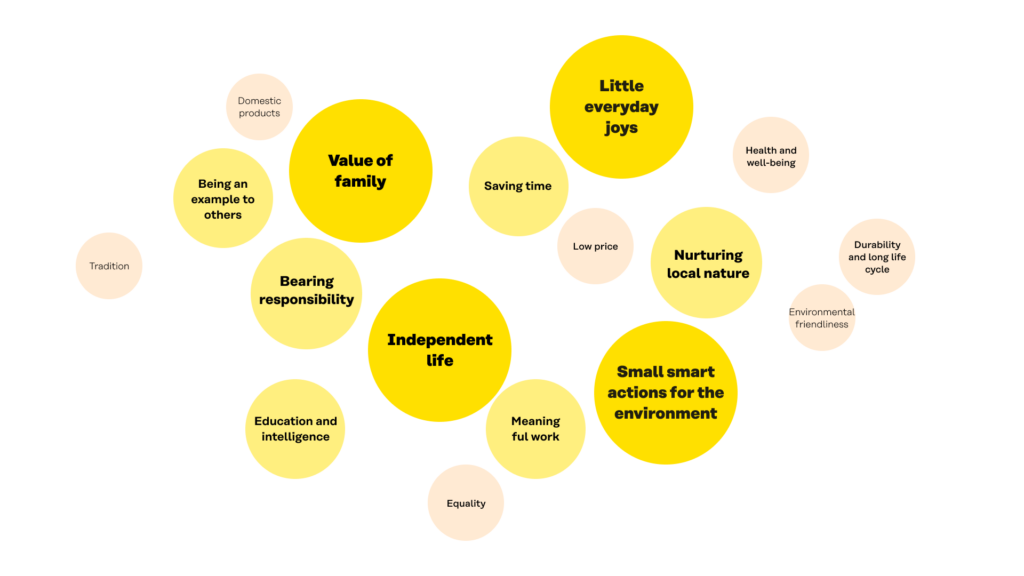
The sustainable everyday actions most often taken by Finns were making short journeys by bike or on foot, favouring Finnish companies, getting rid of unnecessary things, buying new goods in moderation, and consciously avoiding food waste. The increased popularity of domestic travel due to the Covid-19 pandemic was also visible in this study, as 65% of the respondents say that they spend their holidays in Finland (31% in 2017). It is particularly interesting to see how lasting this phenomenon will be.
Many actions related to nutrition are not included among the most common sustainable actions taken by the respondents. However, it is encouraging that almost a third of Finns say that they have adopted a vegetarian diet or reduced meat consumption, and another quarter would do it if it was easier. The new plant-based product innovations brought to the market in recent years serve as a good source of inspiration.
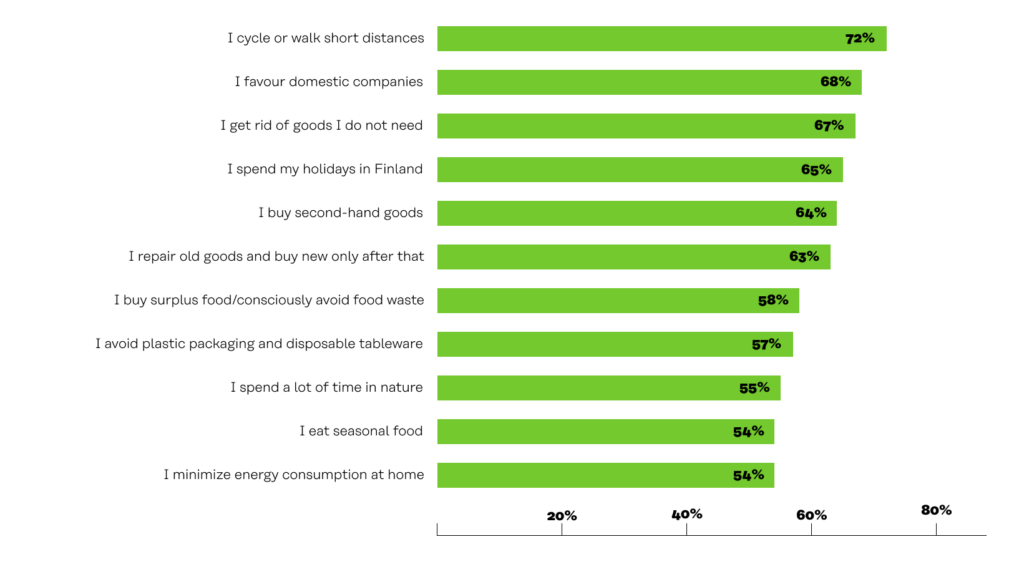
In terms of our study, the essential point is that people are guided to make these and other sustainable everyday choices by different motivating factors – for one person, it is saving time or money, for another it’s health, and for a third concern for the environment.
Explore profiles
Motivation profiles and different values
We identified seven different motivation profiles among Finns.
- Ambitious experience seeker (9% of Finns)
- Headstrong traditionalist (16%)
- Tribal follower (7%)
- Joyful everyday juggler (21%)
- Thrifty optimizer (14%)
- Well-being and nature enthusiast (17%)
- Uncompromising eco-warrior (16%)
The profiles are listed in order from the least sustainable to the most sustainable lifestyle. Each motivation profile represents a group of people with similar values, attitudes, and motivating factors defining their lifestyle. The profiles have been drawn up based on in-depth qualitative interviews and they have been validated using a quantitative study representing the whole of Finland. More information on the implementation and the methods used in the study can be found at the end of this publication in the section How the study was done.
The profiles are motivated by a variety of factors in life that differ from each other. And to complement motivations, the profiles were mirrored against the commonly used Schwarz theory of basic values (2012). The theory defines ten universal basic human values that can be identified independently of culture. For example, for an ambitious experience seeker the focus is on the basic values of achievement and power. They want to succeed and to be among the first to experience new things. The well-being and nature enthusiast, on the other hand, is motivated by the promotion of health and the search for well-being and balance in life. The set of values of an uncompromising eco-warrior is largely defined by the fundamental value of universalism – for them, respect for nature, equality and respect for all people constitute important guiding principles in life. For a joyful everyday juggler, on the other hand, the key values include stimulating experiences and small pleasures of life.
The following value map is based on Schwartz theory of basic human values (Figure 3) illustrates these basic values underlying every profile. The further apart the profiles are in the circle, the more they differ in terms of values. Correspondingly, the profiles close to each other in the circle are similar in terms of values.
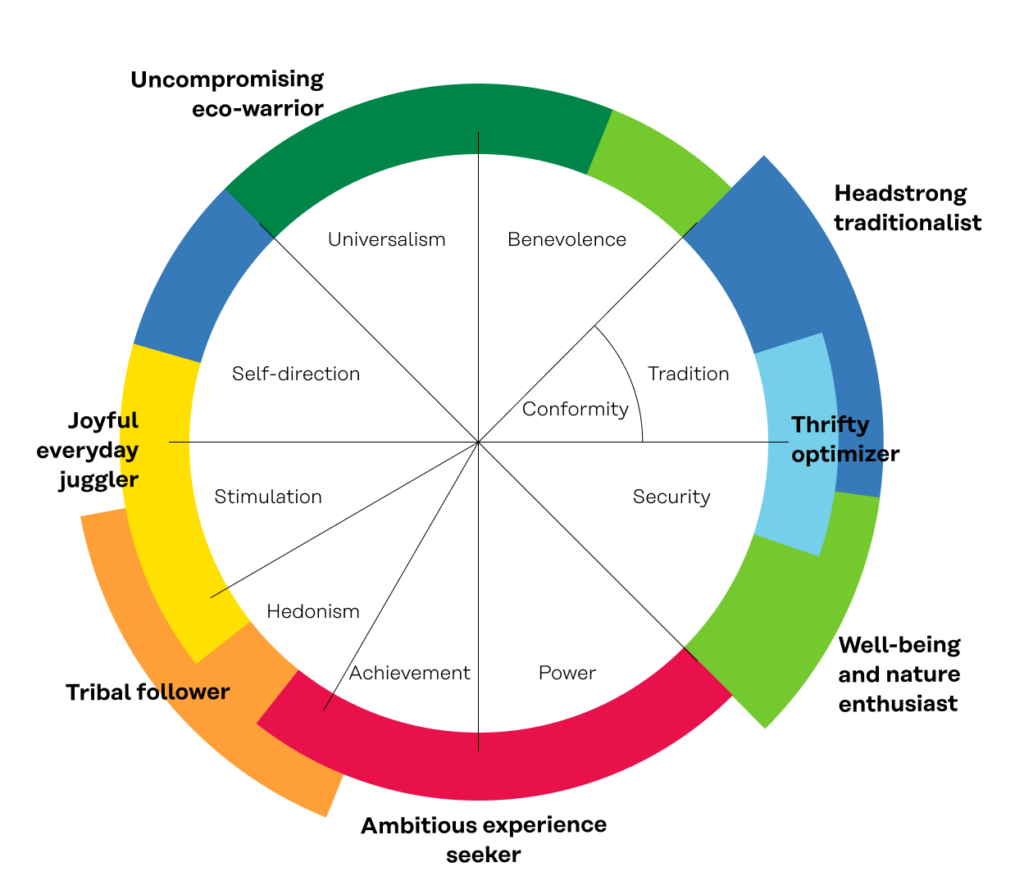
Motivation profiles and a sustainable lifestyle
The profiles clearly differ from each other in terms of how sustainable their lifestyle is. The profiles are also distinguished by whether sustainability is purposeful and a goal in itself, or whether it is realised as a by-product of the choices made or even achieved unconsciously. A sustainable lifestyle means choices and actions that cut across different areas in life and are made within the limits of the planet’s carrying capacity. Sustainable choices and actions have the possibility of inspiring and producing a specific kind of good life for each profile. Understanding these motivation profiles enables us to approach people with different values and attitudes in a more engaging and meaningful way, providing them messages or solutions through viewpoints they consider important.
Many of the choices made by the uncompromising eco-warriors are guided by ecological thinking and value of nature. They are concerned about the state of the environment and make active efforts to reduce their carbon footprint. The thrifty optimizers also have a very sustainable lifestyle. For them, however, sustainability is in most cases a by-product of low consumption and frugality. In the case of ambitious experience seekers, the desire for pleasure and the importance of trying out new things maintains a very large volume of consumption, which increases the environmental footprint of their lifestyle. The percentages in the figure below give the proportion of the Finnish adult population that belong to each profile.
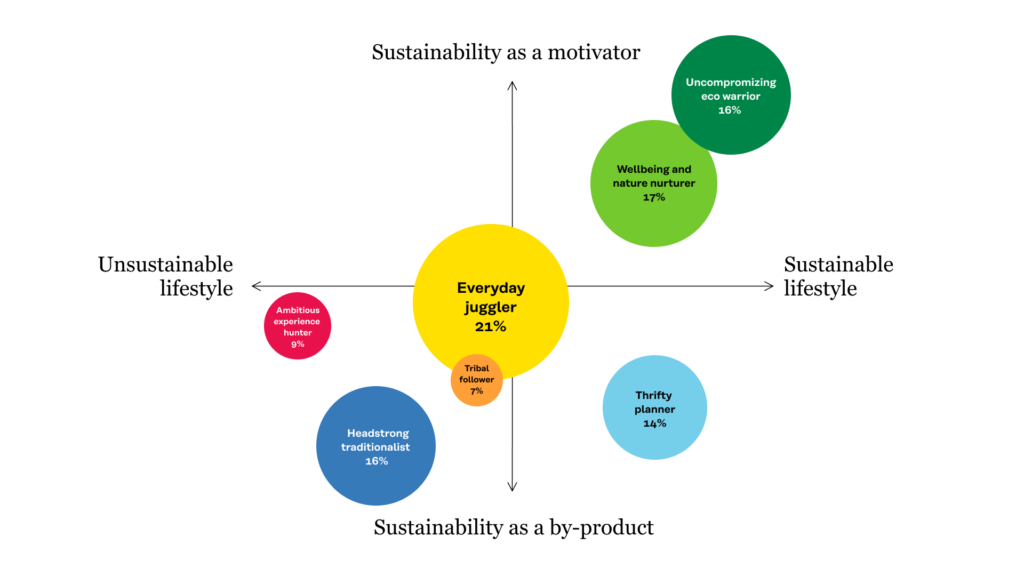
The ambitious experience seeker
Key motivating factors
It is important for me to succeed in my career and life.
I have a demanding taste and I know what I like.
It is important for me to be among the first to try out new things.
Wants to succeed in life and experience as much as possible
The ambitious experience seeker lives life to the fullest. They work hard to succeed and actively seek new experiences in their free time. They are passionate travellers and love dining in good restaurants. It is important for them to be among the first to try out new things. Well-off ambitious experience seekers are quite satisfied with their life. Even though they are often busy, but this does not reduce their joy of living.
The lifestyle of ambitious experience seekers is not on a very sustainable path, and environmental friendliness or sustainable everyday actions are not relevant to them. They see technology as a solution to most of the worlds’ problems.
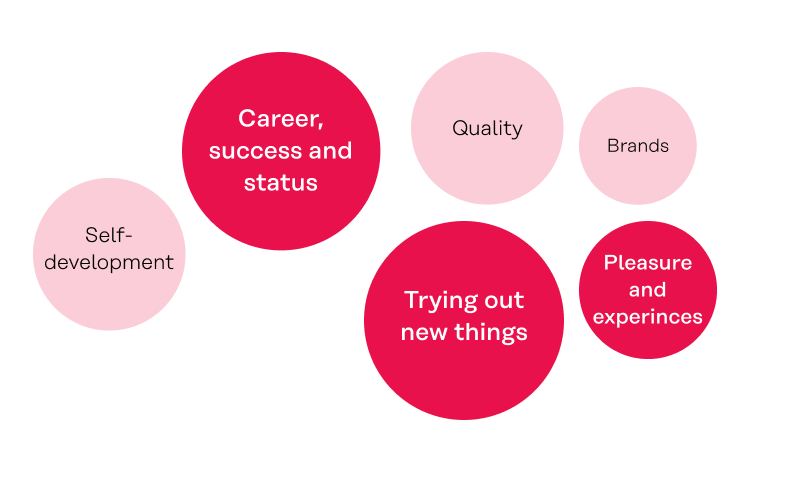
The ambitious experience seeker – motivators and barriers to a sustainable lifestyle
Motivated by status, adventure and quality
First work, then pleasure. Ambitious experience seekers find their greatest motivation from succeeding in their work. Their work must be appreciated by others and meaningful in their own eyes. Achieving a high status is important. As society is increasingly beginning to value sustainable organisations, it could be that ambitious experience seekers will choose their future career paths in line with this trend. This is because status also manifests itself as intellectual capital, knowledge and expertise, not only as things that can be bought with money.
No compromises are made on quality. Ambitious experience seekers have demanding taste and they know what they want. They are very brand conscious. The long-life cycle of the high-quality products they prefer does not make the ambitious experience seeker’s lifestyle more sustainable, as they also tend to update products to the most current version. They are also motivated by personalized solutions and as mentioned before, are amongst the first to try out new things.
Hindered by technocracy and search for new experiences
Being overly confident in solutions offered by technology prevents the ambitious experience seekers from making their everyday life more sustainable. Why make any change in your own life if people, intelligence, and technological development will soon offer solutions to all our problems?
The search for adventure and pleasure often takes the ambitious experience seekers to warm far-away countries. From their holidays they expect new, exciting experiences – work hard, play hard is their ethos. In other words, reducing air travel is not among the choices they are currently willing to make.
The commodities and clothes they buy are new and of high quality – you do not see experience seekers at flea markets. They are not likely to feel much shame, no matter how extravagant their lifestyle is. Their view is that the economy must be kept in motion, and they feel no anxiety about the effects of high volume consumer culture.
Social relations and influencing
People often ask me for advice or opinions.
Ambitious experience seekers have confidence in themselves and their abilities. They feel that other people rely on them and ask for their opinion on different matters. They also express their opinion without hesitation and with self-confidence.
More often than not, close family and friends of ambitious experience seekers include persons in influential positions in society. The experience seekers feel that they can exert influence not only in their work but also through their social network. Personally they follow certain, carefully chosen thought leaders.
The ambitious experience seeker – current and potential actions for a more sustainable everyday life
Although the everyday life of ambitious experience seekers is not very sustainable, they have enough wealth to invest in technological solutions that promote sustainability, which are not within everyone’s reach. This reflects their position in society as the leading-edge consumers in many cases. Thus, a significant number of ambitious experience seekers are, for example, already driving an electric car (or are at least considering buying one) and they have optimised their home’s energy and water consumption to a more sustainable level.
Current actions for a sustainable lifestyle
- Electric car
- Smart solutions for home energy and water consumption
- High-quality products
Potential actions for a sustainable lifestyle
- Use of wind or solar power or geothermal heating
- Walk or cycle short distances
- Buy local food
- Environmentally friendly investments
- Use personal influence to promote causes they find important
For me, my high standard of living is a validation of my own intelligence.
Remember when planning!
- Boost status, especially from the perspective of advanced and smart technology.
- Create an experiential aspect.
- Highlight the quality.
- Create a premium option.
The headstrong traditionalist
Key motivating factors
I value long-established, traditional businesses and organisations
It makes me feel safe that things remain unchanged.
Independent living
The headstrong traditionalists want to march to the beat of their own drum. They feel uncomfortable with the rapid changes in the world and consider many new things unnecessary. Traditionalists are not particularly confident about the future.
Headstrong traditionalists do not seek success. As they have traditional values, home is important for them and they spend a lot of time there. They do not borrow or rent goods but prefer to buy what they need to have as their own. Headstrong traditionalists do not consider their lives particularly sustainable, but this does not really bother them.
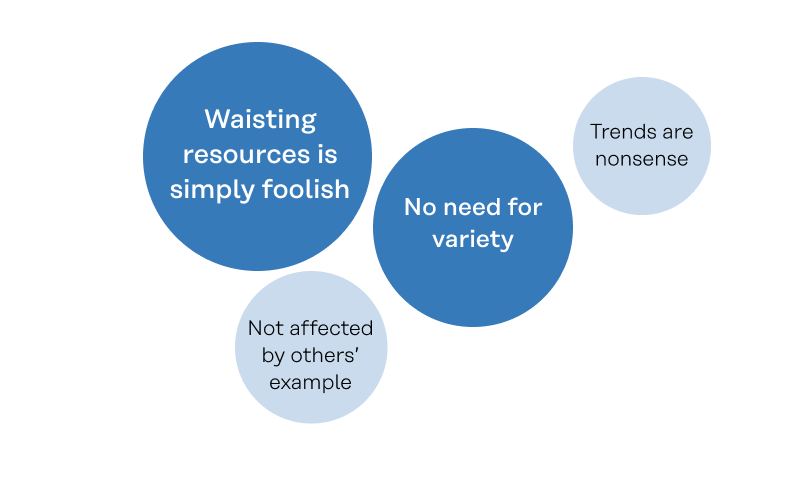
The headstrong traditionalist – motivators and barriers to a sustainable lifestyle
Motivated by close family and familiar things
Even though headstrong traditionalists seldom listen to experts or public opinion, the influence of closest family or friends may make them alter their lifestyle. Familiar systems that have been in place for a long time, such as recycling, seem logical to them. In general, they consider wasting resources irrational.
Hindered by stubbornness
Headstrong traditionalists think that the responsibility for solving environmental issues lies with people other than Finns. Furthermore, they feel that the responsibility should not be laid on people’s everyday lives but rather be taken care of by politicians and enterprises. They often feel that talking about environmental friendliness or the environment is a fuss over nothing. Headstrong traditionalists may actually think that if you are not doing anything to actively harm nature, you are already doing enough. Furthermore, they do not feel that anything they do could really influence the state of the environment.
Social relations and influencing
I value long-established, traditional businesses and organisations
I do not follow any thought leaders, for example, in social media.
The headstrong traditionalists do not feel any pressure to follow others or to meet specific expectations. They are not looking for examples set by other people or social media, and they are reasonably satisfied with the balance they have in their own life. They are not interested in the status provided by brands and often consider new things or phenomena as trendy nonsense.
When making decisions, headstrong traditionalists may listen to someone close them who knows a lot about a specific matter, but in the end still draw their own conclusions. They are especially sceptical about the media and politicians.
The headstrong traditionalist – current and potential actions for a more sustainable everyday life
Even though headstrong traditionalists do not want to put any money on or make any efforts to promote environmentally friendly choices, they do not consume a lot of resources searching for experiences from far-away places or ever-changing hobbies. Traditionalists do not try to distinguish themselves from others with their consumption choices. This reduces their environmental footprint. They do not easily fall for the latest trends, so they do not accumulate masses of novelties and abandon them in their closets.
Current actions for sustainable lifestyle
- Moderate approach to buying products and equipment
Potential actions for sustainable lifestyle
- Favouring domestic companies
- Purchasing second-hand goods or repairing old things
- Eating local food or what is in season
- Updating home energy solutions and measuring their consumption
- Domestic travel
“It doesn’t matter what we do here when the big countries pollute out there.”
Remember when planning!
- Avoid guilt-tripping and appealing to environmental friendliness or values.
- Highlight independence and individual living.
- Emphasise the rationality of saving resources.
The tribal follower
Key motivating factors
The example of other people and my family and friends is important to me.
It is important for me to feel that I am part of the group.
I would like to find a better balance in my life.
Looking for inspiration and balance
The tribal follower mirrors the world through others. They seek examples and inspiration for their own everyday life both from social media and from their family and friends. They often spend money in a careless manner and are particularly interested in fashion and novelties . For the tribal followers, restaurant dinners and international travel are signs of a good life.
Tribal followers are restless and may feel dissatisfied with their life as they are constantly comparing their choices to those of others. At the same time, they yearn for a better balance in their busy everyday life. Sustainable viewpoints may be part of the mindset of a tribal follower. However, they seldom serve as a particularly cross-cutting motivator, being mostly visible as a single concrete action, such as avoiding littering. The tribal followers could be ready to do more for the environment than they are currently doing.
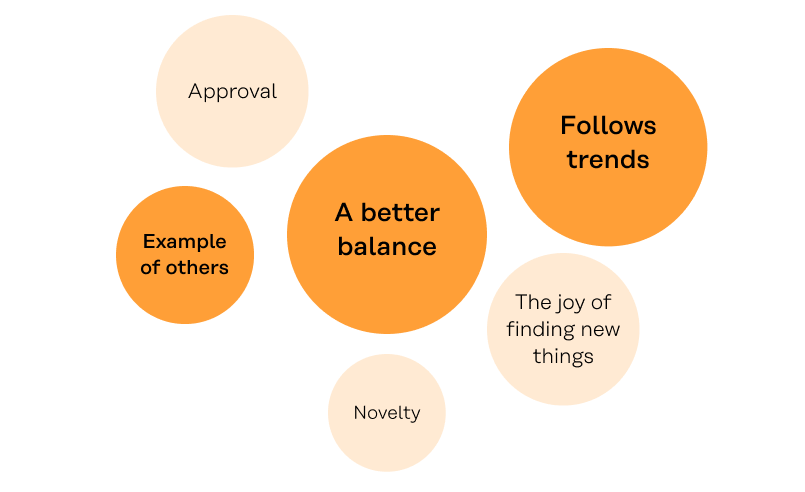
The tribal follower – motivators and barriers to a sustainable lifestyle
Motivated by the example of others
Tribal followers sound out what kind of choices their peers make and follow both good and bad examples. Aspects such as easily available vegetarian food, appealing campaigns and new products get tribal followers to make new, more sustainable choices. The pressure to feel accepted by others can make tribal followers change their habits, and they may feel guilty about their inadequate climate actions. However, for the changes brought about by these negative feelings to persist, the tribal follower would need to be surrounded by a group with a keen interest in sustainability.
On the other hand, tribal followers yearn for a better balance, so getting rid of excess things, reducing activities and using a higher degree of moderation when making purchases could boost their mental well-being.
Hindered by uncertainty and the need to please others
Tribal followers may give in to cravings and sometimes buy more than they should. They feel the pressure to please others and to meet certain expectations, which may lead to frequent changes of style or trying out various hobbies. Platforms bursting with inspiration and other people’s recommendations may encourage them to try out new things, which often results in unnecessary and hasty consumption decisions. Because the pace of life may be fast, it does not feel natural to make long-term plans. They often have their sights fixed on their own peer group and context, which means that they lack more comprehensive perspectives on sustainability.
Social relations and influencing
I follow interesting thought leaders, for example, in social media.
I often learn new ways of thinking from other people.
Tribal followers listen to and follow charismatic people in the public eye. For this reason, alongside matter of fact, news and reports, we should also have stories about concrete sustainable everyday actions people can relate to. Tribal followers may want to be on display, but they do not specifically want to set a personal example for others to follow. This profile is more open to seek perspectives and confirmation for their opinions from other people. For example, social gatherings attract tribal followers to communal activities, which may encourage participation in voluntary work
The tribal follower – current and potential actions for a more sustainable everyday life
The sustainable everyday actions of the tribal followers are clear and easy, such as recycling and selecting vegetarian food in a lunch restaurant. It is also inspiring and meaningful for them to rummage through second-hand clothes and objects at flea markets, which has become quite fashionable. Tribal followers are generally open to more sustainable solutions if adopting them has been made easy for them.
Current actions for sustainable lifestyle
- Buy second-hand goods
- Avoid plastic packaging and disposable tableware
- Domestic travel
- Live near services
Potential actions for sustainable lifestyle
- Buy an electric car
- Reduce air travel
- Borrow goods from friends or lending services
- Buy surplus food
- Reduce things and slow down the rhythm of life
- Vegetarian diet
“I have thought about [more environmentally friendly electricity] but have not switched to it yet. I’m not a very practical person… having to change electricity providers; I just don’t feel like doing the research that that would entail.”
Remember when planning!
- Make the product or service interesting and unique.
- Make use of influencers and trendsetters in marketing.
- Use campaigns and phenomena to help raise awareness.
- The tribal followers are open to sustainability if they have good examples to follow.
The joyful everyday juggler
Key motivating factors
It is important for me to enjoy the small everyday joys of life.
I value things that save me time or make my everyday life easier.
I hunt bargains and often buy what is on special offer.
Everyday life is busy – happiness lies in cherishing the small joys
The routine life of joyful everyday jugglers is rather busy. As they are busy managing their daily hustle and bustle, they pay more attention to today’s small joys than to a sustainable tomorrow. Cherishing the small joys sometimes makes the joyful everyday jugglers spend more money than they intended, but in this paradox lies the spice of life for them. Their choices may be somewhat contradictory in other respects too but living a life that looks like their own is very important to them.
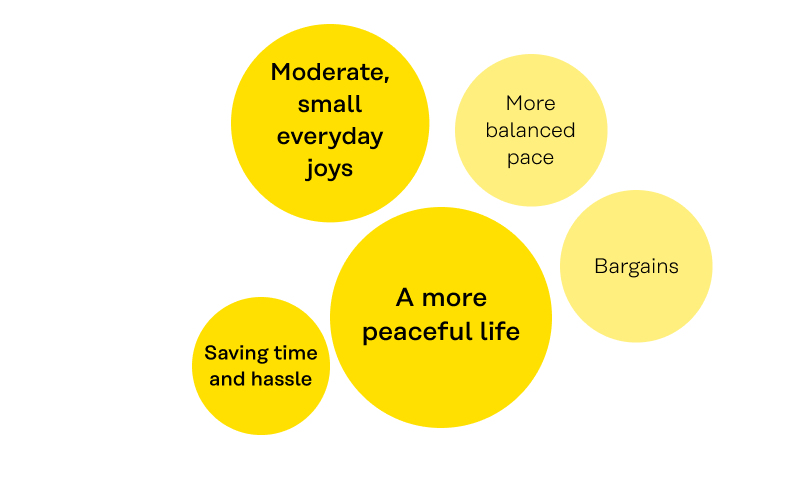
The joyful everyday juggler – motivators and barriers to a sustainable lifestyle
Motivated by saving time, making everyday life easier and special offers
The joyful everyday juggler welcomes things that make everyday life easier and save time. In other respects too, the everyday jugglers are interested in any solutions that brings more peace and creates a sense of balance by making it possible to lead a life that suits them best, without burdening it with excessive duties. When leading a busy life, small joys in everyday moments grab the unwavering attention of a joyful everyday juggler.
The joyful everyday jugglers are also bargain hunters. They do not seek special offers for the general desire to save money, but for the joy of discovery, such as the pleasure of achieving a small benefit.
Hindered by everyday hedonism and focusing attention on other things
If the joyful everyday jugglers have failed to fill up their feel-good reserves with small and meaningful joys, they are very prone to unnecessary consumption. Small impulse buys are a big temptation for joyful everyday jugglers.
In the big picture, the attention is here and now – sustainability or a change in lifestyle are not amongst the biggest of worries. Also, the lack of a systemic approach and avoidance of responsibility in their own life prevents them from making a change. It is not customary for the joyful everyday jugglers to require corporate responsibility or to shift responsibility to the arena of international politics. They think sustainability impacts are generated through people’s individual actions. Yet, their own actions are modest, small and logical actions, such as recycling and they have no time or motivation to promote things in a bigger scale.
Social relations and influencing
I often want to ask for other people’s opinion when I make decisions.
Joyful everyday jugglers seldom follow influencers or opinion leaders. They get their information and views through more traditional channels. They also seek affirmation for their beliefs from people close to them – family, friends, colleagues – and in return, are also often asked for their views. Joyful everyday jugglers generally consider official news sources reliable.
The joyful everyday juggler – current and potential actions for a more sustainable everyday life
In their everyday life, joyful everyday jugglers take small smart actions, such as buying second-hand clothes for their children, avoiding waste, and borrowing things whenever possible. Recycling and sorting of waste are also part of their everyday life. For them it is important that sustainable actions make everyday life easier or are quite easy to implement. For example, increasing time spent in local nature and travel in Finland may be attractive options compared to the extensive arrangements required for international trips.
Current actions for sustainable lifestyle
- Buy second-hand goods
- Buy surplus food/make a conscious effort to avoid food waste
- Borrow from friends/neighbours
Potential actions for sustainable lifestyle
- Buy local food
- Avoid plastic packaging
- Spend time in nature
- Domestic travel
“I must admit that there are some conflicts [in my own actions], but I don’t feel guilty about it.”
“I would like to say that I avoid [packaging], but I really don’t. I do buy take-away coffees.”
Remember when planning!
- Plan for ease (easy to adopt and use).
- Offer solutions that make everyday life easier.
- Bring joy to everyday life.
- Use special offers.
The thrifty optimizer
Key motivating factors
I am very thrifty.
I only buy what I need.
Thrifty and simple life
The thrifty optimizer appreciates a modest life and smart use of resources. They are not looking for any greater pleasures, experiences or pampering, but are happy with their life. They find joy in small things and everyday routines. Thrifty optimizers do not dream about journeys to faraway countries or fancy restaurant dinners. Discipline and everyday routines bring a sense of security to their life.
Thrifty optimizers have made conscious efforts to simplify their life by reducing the amount of goods or activities they have. They make their decisions after careful considerations, not inspired by the examples of others. Their consumption habits are characterised by prudence and frugality. Their purchases are highly based on needs and seldom includes impulse buys. Thrifty optimizers have a low volume of consumption, and, thanks to that, their life is environmentally sustainable.
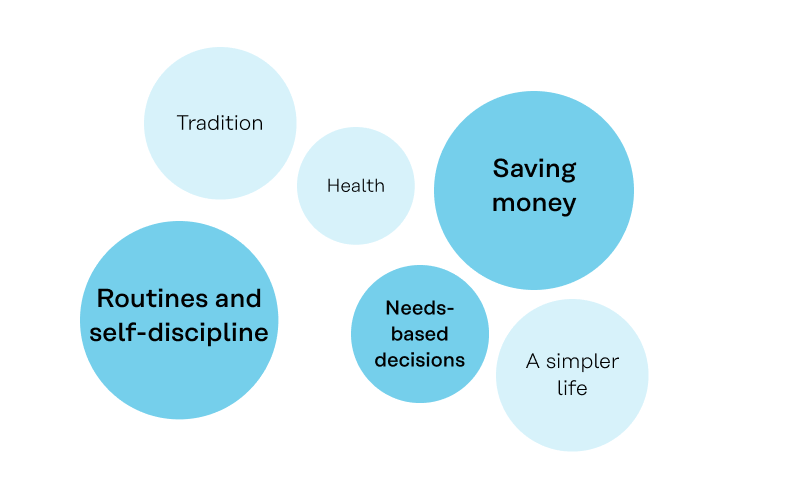
The thrifty optimizer – motivators and barriers to a sustainable lifestyle
Motivated by saving money
Thrifty optimizers do not make conscious choices with the emphasis on environmental values. Still, they feel that they are fairly environmentally friendly, because they consume so little. Saving money is an important motivating factor for thrifty optimizers, and their purchases are based on careful consideration of needs. They feel that the best way to support the environment is through small and economical smart actions, such as avoiding waste, recycling, and running full loads in a washing machine.
Hindered by sticking to routines
The life of a thrifty optimizer is at a sustainable level. However, one of the key factors that may slow down their ability to adopt new, more environmentally friendly choices may be their need to hold on to familiar and safe operating models. They are seldom inspired by the example of other people. Instead, the benefits of the actions taken should be easy to see, and preferably such that they materialise in the form of money saved.
Social relations and influencing
I trust official news sources.
When gathering information, the thrifty optimizers trust official news sources and traditional media. They are not particularly interested in the opinions of other people or feel influenced by others. Furthermore, they do not feel a need to influence others or to act as forerunners.
The thrifty optimizer – current and potential actions for a more sustainable everyday life
The sustainable everyday actions of a thrifty optimizer are typically aimed at saving money. They repair old goods rather than buy new ones and minimize their home’s electricity bill by saving energy. Exercise due to everyday action like walking places or taking the stairs does not cost anything and, on top of that, they are better for health and thus, are already part of their everyday lives.
Current actions for sustainable lifestyle
- Repair old goods
- Exercise due to everyday action that happens amid everyday life
- Avoid plastic packaging and disposable tableware
- Domestic travel
- Minimise energy consumption
Potential actions for sustainable lifestyle
- Borrow goods from friends or lending services
- Local/seasonal food
- Move to a smaller apartment
“Sometimes it feels a little like I’m doing an experiment on how far you can go wearing out your clothes. I have this specific set of clothes I’ve been mending over and over again. Our children’s clothes we’ve gotten from others or bought from flea markets.”
Remember when planning!
- Clearly highlight the costs saved in euros.
- Emphasize small steps, actions that are easy to include in everyday activities.
The well-being and nature enthusiast
Key motivating factors
Physical activity and healthy food are very important to me in life.
I pay a lot of attention to my mental well-being.
I spend a lot of time in nature engaged in my hobbies.
Well-being and balance of life
Well-being and nature enthusiasts want to live a balanced life in which physical activity, healthy diet, and mental well-being play a key role. They are quite satisfied with their life and confident in their future. Spending time in nature and thus taking care of it, is very important to them.
As a consumer, well-being and nature enthusiasts are fairly prudent and selective. They give priority to high-quality and sustainable options and emphasise domestic and local origin of their choices. Therefore, they estimate their own life to be at a fairly sustainable level from an environmental perspective.
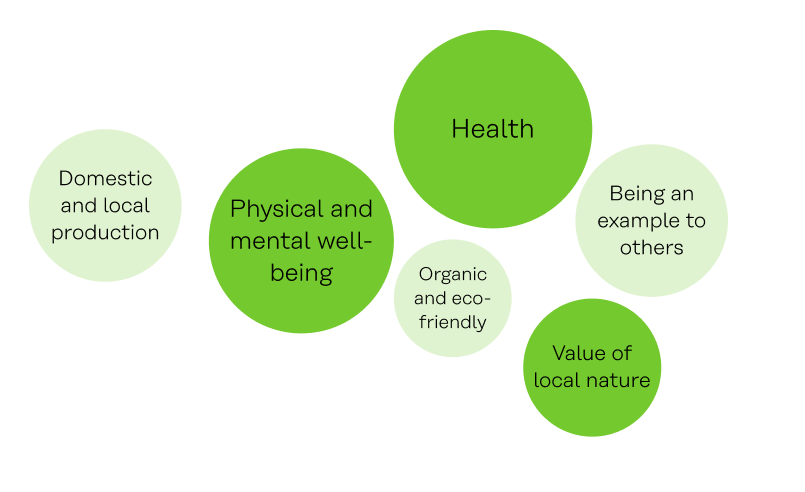
The well-being and nature enthusiast – motivators and barriers to a sustainable lifestyle
Motivated by promotion of health
Well-being and nature enthusiasts are concerned about how environmental loads of production affect health. In most areas of life, they emphasise choices that boost health or minimise health hazards. For example, incidental daily exercise and favouring organic products are everyday choices that promote well-being.
For them, local nature is an important source of well-being and calm and they are hence concerned about its state and loss of biodiversity. This concern motivates well-being and nature enthusiasts to make more sustainable choices.
Hindered by yearning for new experiences
In many respects, their lifestyle is at a fairly sustainable level. Still, the yearning for new experiences may mean long-distance air travel or a large volume of consumption due to, for example, acquiring new recreational equipment.
Social relations and influencing
I have changed my activities in a more environmentally friendly direction, for example, when it comes to eating based on the articles I read or the documentaries I watch.
In the acquisition of information, well-being and nature enthusiasts largely rely on official news sources. They are interested in nature and are eager to obtain more information on the subject.
They are satisfied with the choices they make and do not feel much pressure to please others or to act in a certain way.
In social relationships, they are not the loudest promoters of their own values or choices instead they believe that their actions will speak for themselves. They want to show a good example to others with their own actions.
The well-being and nature enthusiast – current and potential actions for a more sustainable everyday life
The life of well-being and nature enthusiasts already includes many choices that promote sustainability. Locally produced seasonal food is good for both health and nature. Small-scale vegetable farming and doing crafts are likely to increase appreciation for the food they eat and the things they use.
Current actions for sustainable lifestyle
- Exercise due to everyday action (walking and cycling)
- Favour locally produced seasonal food
- Substitute dairy products with plant-based alternatives
- Do it yourself: growing vegetables, handicrafts
- Avoid plastic packaging and disposable tableware
- Interest in smart solutions and energy efficiency at home
- Contribute actively to the affairs of one’s own residential area and the attractiveness of the nearby environment
Potential actions for sustainable lifestyle
- Reduce/avoid air travel
- Reduce/stop meat consumption
- Change in behaviour based on measured data
“A healthy lifestyle is the foundation for everything. If that is in order, you can be the best version of yourself. When the world offers nice opportunities, you’re in shape to seize them.”
Remember when planning!
Highlight positive health and well-being impacts.
Bring up benefits to the environment.
Emphasise quality, durability, and long-life cycle of buys.
The uncompromising eco-warrior
Key motivating factors
I am distressed by constant, pointless buying and consumption
Through my decisions and actions, I can have a positive impact on environmental and climate issues.
I am concerned about the state of nature and the loss of biodiversity.
Climate and the environment at the core
Uncompromising eco-warriors’ actions are particularly motivated by care for the environment and being involved in sustainable change. They consider climate change and biodiversity loss as acute crises and are taking active steps to change their lifestyles in a more sustainable direction. Concern about the climate defines many of their choices in different areas of life, especially their consumption habits. In addition, uncompromising eco-warriors also want to promote social equality. To counterbalance their concern, they are more likely to choose a job that is in line with their own values. In their own opinion, uncompromising eco-warriors live sustainably, but feel they could always do more.
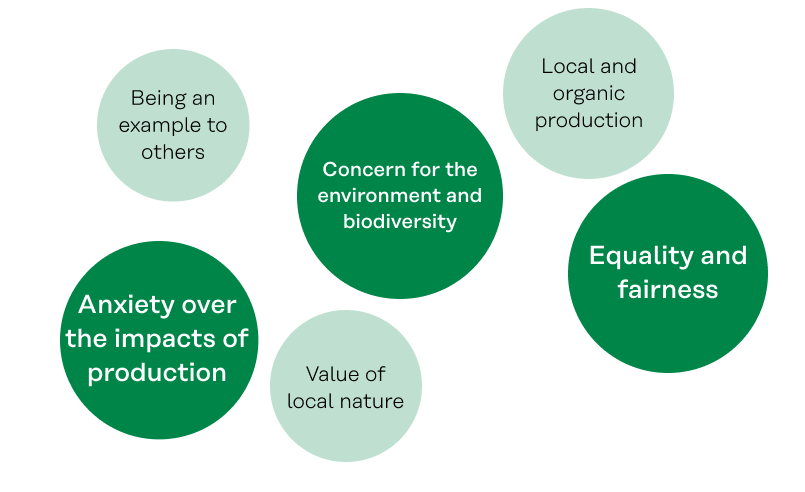
The uncompromising eco-warrior – motivators and barriers to a sustainable lifestyle
Motivated by genuine concern and a sense of responsibility
Concern for future generations and the impacts of climate change motivates uncompromising eco-warriors to make many of the sustainable choices that are possible for them personally. They genuinely believe in the individual’s possibilities to influence matters. Anxiety about the mistreatment of the environment, animals, and other people also motivates the uncompromising eco-warriors to take action.
Hindered by a sense of being overwhelmed
Uncompromising eco-warriors are largely doing the best they can in their life situation, but there might still be room for some changes. On the other hand, continuous reflection on what would be best for the environment can even become a burden – excessive concern and anxiety can become exhausting. The constant areas of improvement competing with each other and too many changes at a time can blur the vision of what would be the most important and effective choices in their life as a whole.
Social relations and influencing
It is important for me to promote justice and equality.
Uncompromising eco-warriors believe that we should all bear our responsibility for a sustainable future. They understand the impact of personal choices as one part of a multidimensional problem. Everyone’s contribution is needed in the fight against climate change, including enterprises, politicians, and individuals living their everyday life. Every uncompromising eco-warrior may not be a loud activist, but they often feel that it is their duty to act as a good example and to talk to others about the problems they consider important. uncompromising eco-warriors also actively acquire information on the state of the world from different sources.
The uncompromising eco-warrior – current and potential actions for a more sustainable everyday life
The uncompromising eco-warrior has already done many of the easy, everyday changes – what remains are more radical and demanding shifts, such as activism, or major changes in life, such as moving to another place. The eco-warriors avoid air travel, have reduced consumption and use their things until the end of their life cycle. They also primarily repair things before buying new ones. In addition, eco-warriors actively promote sustainability by signing petitions or initiatives and participating in voluntary work.
Current actions for sustainable lifestyle
- Favour locally produced seasonal food
- Substitute dairy products with plant-based alternatives, reduce/stop meat consumption
- Do it yourself: growing vegetables, DIY, handicrafts
- Public transport, cycling and walking
- Minimise energy consumption by reducing temperature and saving warm water, and the use of sustainable energy sources
Potential actions for sustainable lifestyle
- Stop air travel
- Give up the car or shift to an electric car
- Self-generation of more environmentally friendly energy (solar panels, geothermal heating)
- Switch entirely to a vegetarian or vegan diet
- Engage in municipal politics or other forms of influencing
“I became interested in climate issues years ago and wanted to do something for my own part. I found out about things and started making changes. The times when I used to go shopping for fun after work feel really distant now.”
Remember when planning!
Green washing won’t fly – inform about real impacts.
Emphasise quality, durability, and long life.
Summary of motivation profiles
Different messages and actions appeal to different motivation profiles. For uncompromising eco-warriors, environmental friendliness and working for the environment and the climate are extremely important matters, and it is also advisable to emphasise these themes in messages and solutions directed at them. The joyful everyday jugglers have a neutral attitude towards sustainability focused themes and related communication. However, you are most likely to achieve a better impact if you can communicate about other characteristics, such as making everyday life easier or saving time. The headstrong traditionalists approach environmental and climate messages with reluctance. They want to lead an independent life in a way that they consider familiar. In their case, emphasising the making of independent choices and, for example, the sensibility of saving resources work significantly better than overt climate messages.
How the study was done
Background and objective
The objective of Sitra’s Sustainable everyday life project is to enable a good life within the limits of the world’s carrying capacity. To achieve this goal, it is essential that we design and conceptualise scalable tools that can be used by all of us – organisations, local authorities, enterprises and citizens – for guiding people towards more sustainable everyday choices in a global scale.
In this study, we applied the lessons learned from both the smart consumption profiles we created earlier and the insights generated by the Canadian organisation, One Earth, in their motivation profile study.
This time, we wanted to expand the scope of the study from dealing only with consumption to also include people’s lifestyles and choices. The aim was to find out what motivates Finnish people to lead a sustainable lifestyle, how a sustainable lifestyle can be made more commonplace, and what kinds of solutions could be used to support different people in this process. The work started with a background study to define the relevant lifestyle areas for this report.
Defining the scope of the topic and theory review
To define the scope of the topic and to specify it further, we analysed trends and forces of change that are affecting sustainable lifestyles. We also conducted four expert interviews with specialists looking at lifestyle and consumption from different perspectives. The top experts interviewed brought in expertise from the fields of academic consumer research, behavioural sciences, religious studies, and strategic consumer insight .
Experts interviewed for the study:
- Mikko Kurenlahti, University of Helsinki
- Samuel Piha, University of Turku
- Oskar Korkman, Alice Labs
- Kate White, UBC Sauder School of Business
The interviewees brought up topical themes such as the increased importance of well-being and health, new attitudes towards how people use their time, social pressure and flight shame related to climate issues, the increased importance of the home, the need for downshifting, and the lifestyles changed by the Covid 19 pandemic.
When studying sustainable lifestyles, we must take into account the values and attitudes that guide human behaviour. Schwarz’s (2012) value theory defines 10 universal basic values that can be identified independent of culture. These values form a circular structure in accordance with four basic dimensions that reflect the motivations behind each value. The basic dimensions are Self-transcendence, Conservation, Self-enhancement and Openness to change. For the values that are close to each other in the circle, the motivations are similar and psychologically compatible, whereas for those further apart, the motivations are different and incompatible with each other. For example, achievement (personal success) and benevolence (promotion of the well-being of other people) are seen as mutually contradictory values. (Helkama 2015). Figure 3 illustrates the placement of profiles in the model based on Schwarz’s value theory.
It is also interesting to examine how people justify and explain their choices in different ways. According to Boltanski and Thévenot (2006), people act for or against issues basing their choices on different cultural-historical worlds. Where one justifies their choices through economic considerations (money, gaining wealth), the other emphasises solidarity and joint responsibility in their justifications. Similarly, people are influenced by different arguments depending on moral perceptions or orders of worth, of the shared values. In addition to the above, orders of worth also include the industrial order that emphasises efficiency, the order of fame drawing on the opinions of others, the inspired order that emphasises creativity, and the domestic order that highlights personal relationships. Later, the list of orders has been supplemented with, for example, the green order of worth, in which the preservation of biodiversity is a key argument. From the point of view of this study, it is essential to understand that for some consumers justifications based on environmental friendliness are likely to serve, for example, as justification for political decisions, whereas to others the financial benefits of the same measure serve as a key argument.
Figure 12 illustrates the key aspects of the study, which are based on the scope defined through the expert interviews and the aforementioned theories.

In terms of the scope of the study, it was essential to define what we mean when we talk about the consumers’ lifestyles, and the values and motives that guide them towards more sustainable choices. A lifestyle can be studied by measuring the consumers’ activities, interests and opinions. (González and Bello 2002).
From the viewpoint of sustainability, it was also essential to include those areas of consumption that are considered to have the greatest impact on the carbon footprint of individuals. According to the 1.5 degree lifestyles study, a major part of the consumers’ carbon footprint consists of four areas of consumption: food, housing, mobility, and the acquisition of goods and services.
Figure 13 illustrates the areas of lifestyle and consumption, described in more detail above, that have been taken into account in the study.
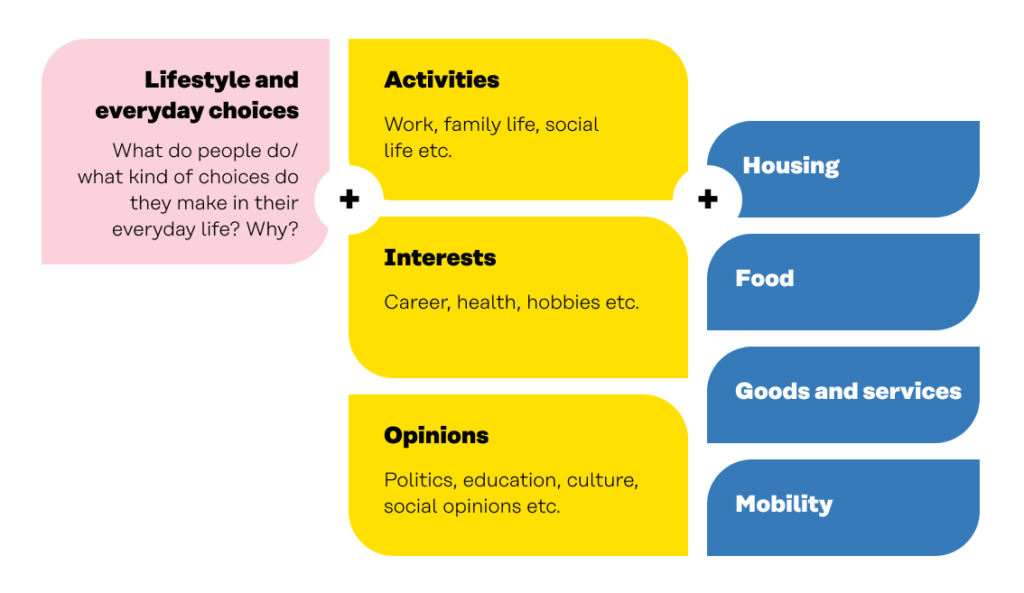
Consumer interviews and quantitative study
After specifying the topic of the study, we conducted 15 in-depth interviews with Finns living in different parts of the country sounding out the motives, attitudes and actions of more sustainable lifestyles. Because of the Covid-19 pandemic, the interviews were conducted remotely, via video calls. Based on the interviews, we formed motive-based hypothesis profiles that we validated using a national quantitative study of the Finnish adult population conducted through the Norstat consumer panel, N = 1177. The final profiles were formed from the quantitative data using a cluster analysis. The analysis is built on a set of value statements reflecting the lifestyles and motives based on the areas presented above. The purpose of the cluster analysis is to identify attitude groups that are internally homogeneous and are also as clearly distinguishable from each other as possible.
The whole study was implemented between March and August 2021.
Acknowledgements
Expert interviewees
Mikko Kurenlahti, University of Helsinki
Samuel Piha, University of Vaasa
Oskar Korkman, Alice Labs
Kate White, UBC Sauder School of Business
Finnish participants in the study
15 Finns who participated in the interviews and 1,177 Finns who responded to the quantitative survey.
The Canadian One Earth Team
Dagmar Timmer
Lindsey Boyle
Vanessa Timmer
Rosemary Cooper
Majid Khoury
Sitra’s Sustainable everyday life team
Sari Laine
Markus Terho
Salla Nurminen
Saara Rimon
Emma Hietaniemi
Dushyant Manchandia
Solita
Kaisa Kaitosalmi
Topias Tuomisto
Eevi Saarikoski
We also wish to thank the other Solita employees who have brought their views and insights to the study: Olli Lindroos, Antti Rannisto, Saana Tikkanen, Elisa Suvanto, Manu Setälä, Paula Karlsson and Mataleena Pöyhtäri.
Sources
Boltanski, L. & Thévenot, L. (2006). On Justification: Economies of Worth. Princeton: Princeton University Press.
González, A.M. and Bello, L. (2002), “The construct “lifestyle” in market segmentation: The behaviour of tourist consumers”, European Journal of Marketing, February 2002, Vol. 36 No. 1/2
Helkama, K. (2015). Suomalaisten arvot – Mikä meille on oikeasti tärkeää? (In Finnish; Finnish values – What is really important to us?) Helsinki: Finnish Literature Society, Helsinki.
Holt, D. B. (1995): How Consumers Consume: A Typology of Consumption Practices, Journal of Consumer Research, June 1995, Vol. 22, Issue 1.
Lettenmeier, M., Akenji, L., Toivio, V., Koide, R., Amellina, A. 2019. 1.5-degree Lifestyles. Targets and options for reducing lifestyle carbon footprints. Sitra Studies 149.
One Earth, 2021: OneEarth / Share Reuse Repair Initiative (2021), 7 Motivations for Lighter Living Action in British Columbia. Vancouver, Canada: OneEarth / SRRI.
Ryan, R.M., editor (2019): The Oxford Handbook of Human Motivation. Oxford University Press Inc. 2019.
Sitra ja Alica Labs, 2020: Lifestyles after lockdown
Sitra and Palmu, 2018: Smart consumption in Finland.Using motivation profiles to support business planning. Sitra, Helsinki, Finland.
Trendwatching, 2021: https://info.trendwatching.com/
Rogers, W. M. & Loitz C. C. (2009). The role of motivation in behavior change. How Do We Encourage Our Clients To Be Active? ACSM s Health & Fitness Journal, January 2009, Volume 13, Issue 1.
Schwartz, S. H. (2012). An Overview of the Schwartz Theory of Basic Values. Online Readings in Psychology and Culture, 2(1).
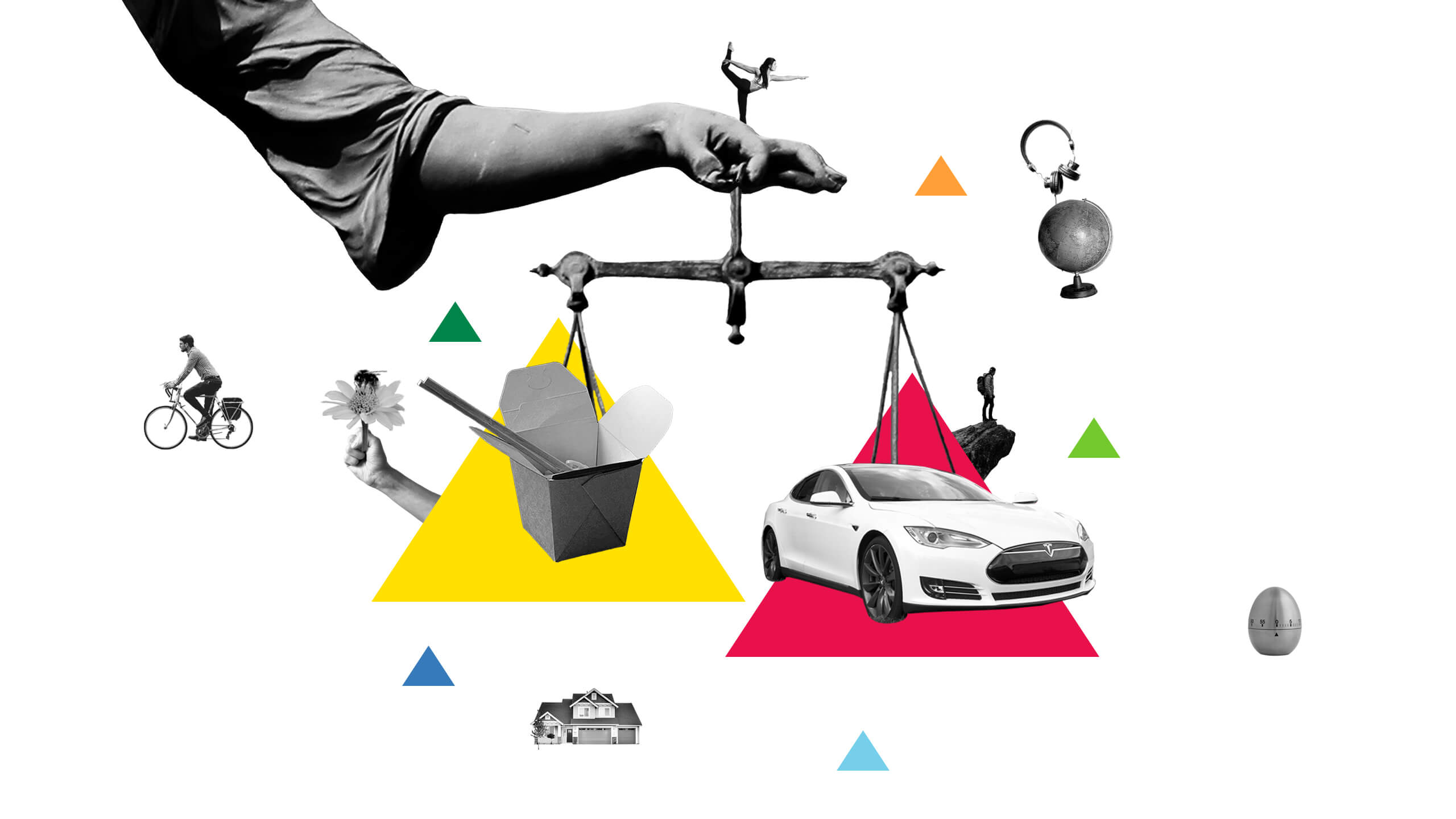
























Recommended
Have some more.